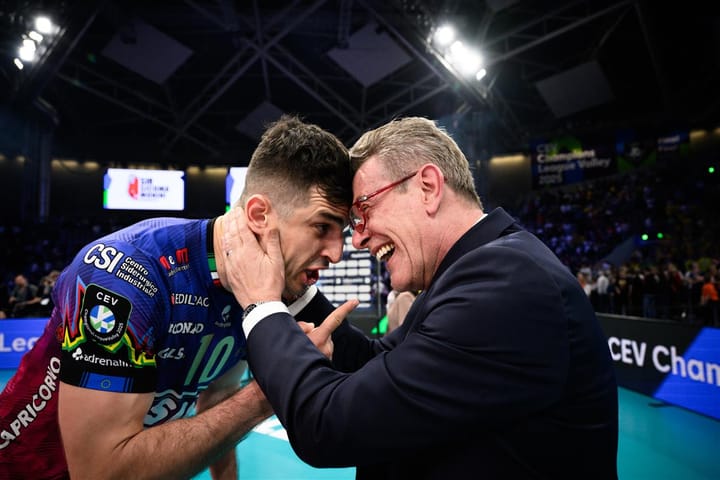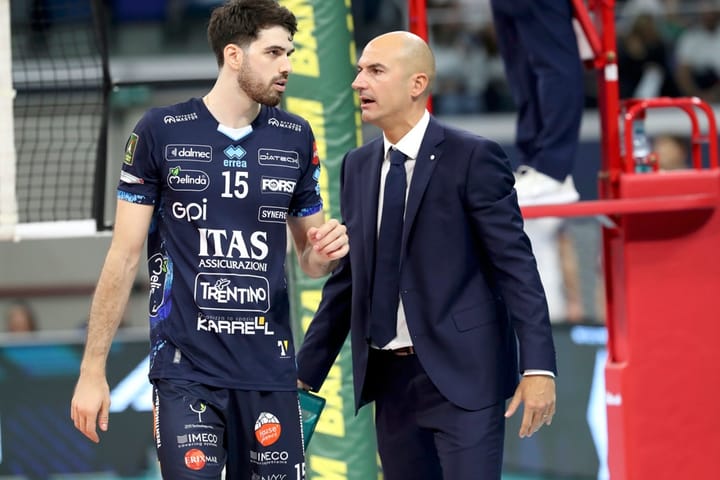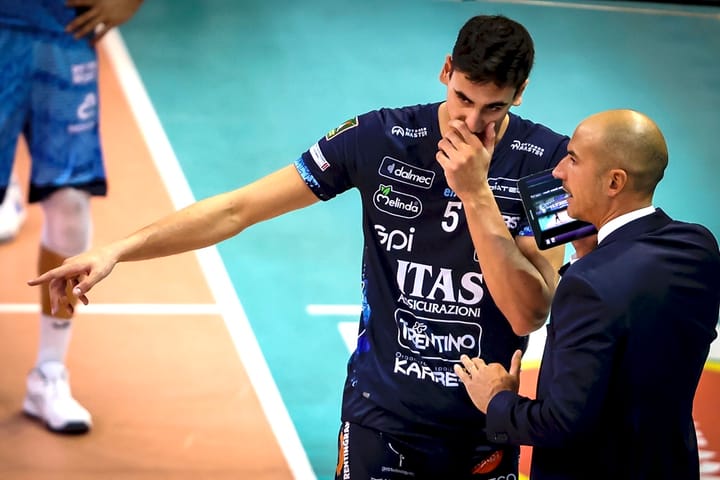50. Nicola Negro: 'The game teaches us how we need to coach.'
In today's Masterclass we feature Nicola Negro the head coach of Minas. Minas is current South America's strongest club team, after having won 3 straight Brazilian Superliga's, the 2022 South American Club Championship and many more titles and cups.
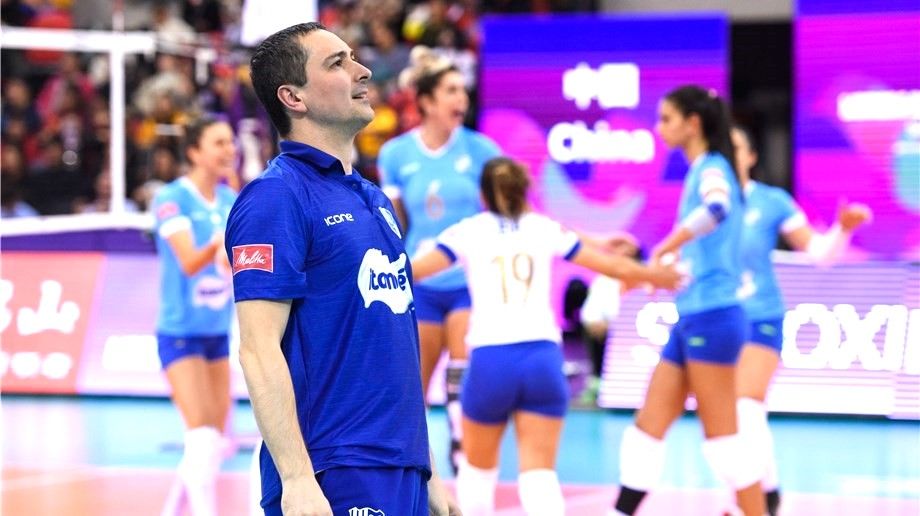
Nicola started his journey in professional volleyball nearly 20 years ago and coached in Italy, Turkey, Azerbaijan, Slovenia, Poland, Romania and for the last 4 years in Brazil at Minas.
In this Masterclass Nicola talks both about his own journey, how he sees our sport evolving over the next years, how the game itself is actually a great yardstick to know how to improve your coaching and so much more.
Also some important messages in here about the randomness of being a pro club coach and how Nicola goes about being a professional in those types of situations.
Enter Nicola...
Nicola, why did you decide to commit to being a professional volleyball coach? What pushed you towards that decision?
Okay, let's return to the 1990s. I was an athlete in my youth. I was fortunate to grow up in Italy. During a time when our volleyball was the best in the world. Late 1990s and early 2000s.
In Italy, at that time, we simply had the best coaches and the best players. And every weekend I had the chance to see these incredible athletes.
Stork, Kiraly, and Timmons. All the Brazilians: Giovane, Tande, Mauricio. The Italians, as Italy dominated men's volleyball during that time period. And simultaneously I made that initial contact with women's volleyball.
I recall taking the train to Bergamo in order to watch the Cubans play. In that era, the level of volleyball in Italy was astounding.
Why did I choose to become a coach? Because of my height, I did not have great prospects as a player. I've always wanted to compete on the highest level of volleyball. As a player, it was not possible to do so.
That is why I decided to switch careers and become a coach at a young age. I began coaching when I was 19 years old. I wanted to live volleyball at the highest level.
And thankfully, it worked out.
What advice would you give yourself as a starting coach? An advice that is so clear and logic for you now, but that you had to develop over the years.
I will tell you the same thing I told myself when I first started out. My family didn't play volleyball. So I had to look for everything and figure it out on my own.
My first few years were very important to me. I wasn't a professional coach yet at that time. I was working. So, I remember that every time I had a day off or a holiday, I went somewhere and tried to get in touch with the best volleyball players.
Twenty years ago, things weren't like they are now.
Today, it's a lot simpler. If you go to the internet, YouTube, or another website, you can find a lot of videos, podcasts, and other kinds of information. It wasn't like that 20 years ago.
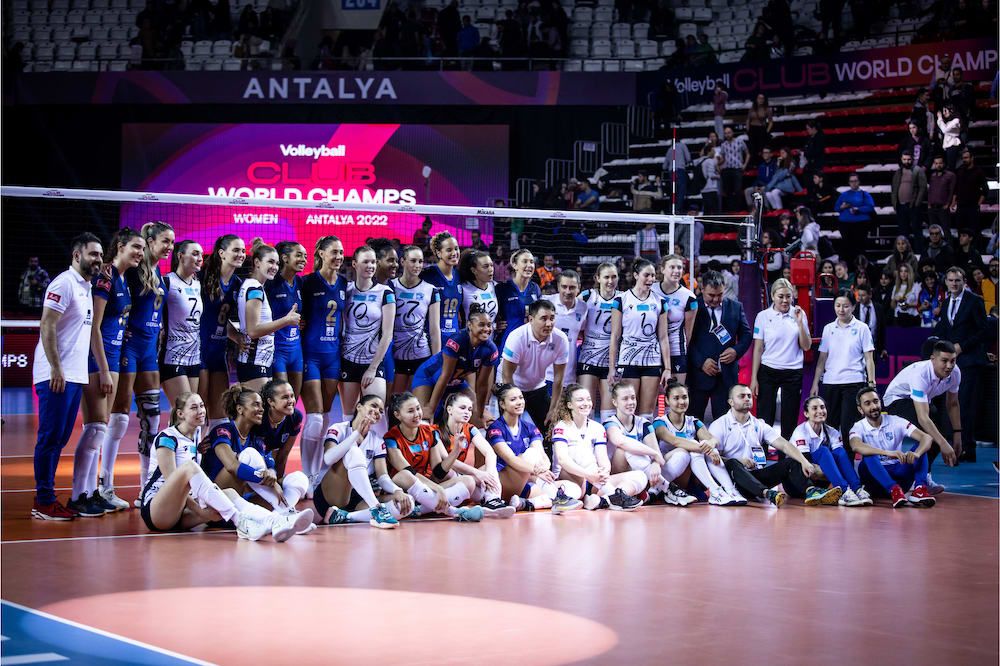
Twenty years ago, it was a real treasure to have a VHS tape or video of a national team practice. It was a very rare thing.
And I remember that for 3 or 4 years in a row, I didn't go to the beach for my vacation. Instead, I went to Montreux.
In the month of June, this important event took place in Montreux. It was one of the few times when the world's most important national teams were playing near where I lived, in Switzerland.
I spent those 3–4 years of vacations in Montreux. Like a clinic and a time for me to grow. I thought of it as the "university of volleyball."
The first time I ever got to see a practice of the USA national volleyball team. Or a Brazil training with Ze Roberto. A Japanese training. I mean, talking about it today doesn't have the same effect because it's so easy to do these things now. But things were different 20 years ago.
I think I invested a lot in myself and this was important for me in the beginning.
And it would be the same advice that I would give myself today. Invest in yourself.
Minas' Superliga 2022 championship point!
Do you have a particular goal? What drives you today?
I have a daily objective. The goal is to do the best possible job. And strive to improve as a person, and as a coach every day.
That is the daily objective. Then there are some lofty objectives. And, of course, like any athlete, the ultimate goal and dream will be to compete in the Olympic Games.
This is a dream that may one day come true. And I believe that, even if it is a pipe dream, it should be the goal of every athlete.
My more concrete goal is to be able to return and work with a national team. Being the assistant coach of the Turkish national team for four years was a life-changing experience for me.
However, this was 12 years ago. I haven't worked in a national team environment in 12 years. And this is something I feel I am missing professionally.
So I'm hoping to get back to working with a national team one day.
*At the beginning of 2023 the Mexican federation put Nicola in charge of their national women's program (supported by the FIVB's Empowerment Project)
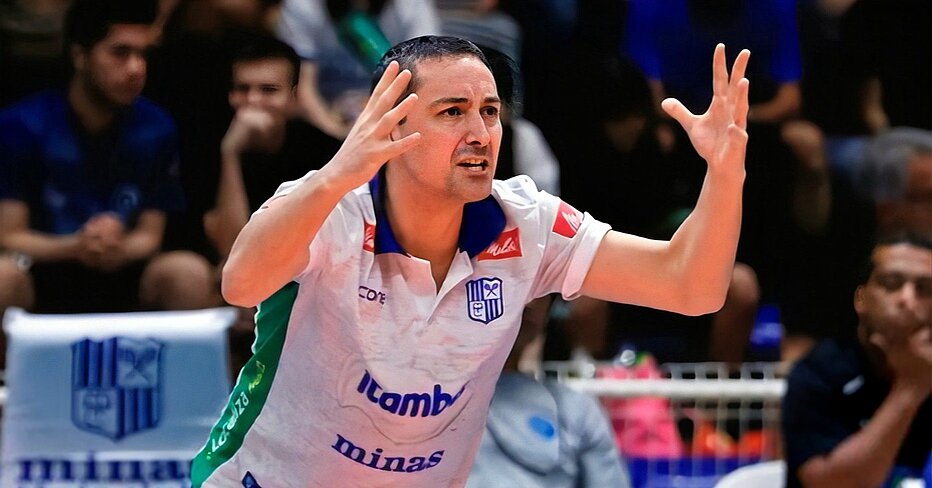
Team management. Sometimes managing completely different teams year over year. Do you have any methods that you reach back to?
My approach has evolved significantly over the years. .
In my early years, especially as an assistant coach, I had to work with a lot of rules, fixed rules, and limitations, both on and off the court, as well as in and out of the gym.
But, over time, I changed my approach significantly, influenced in part by watching and talking to other coaches.
The rules that I want to be followed now are all within the dimensions of the court. I mean, the real discipline for me is about what happens on the court.
This is my approach at the moment. I'm not interested in rules. I want a few rules and that the players respect the group.
I enforce these rules only when I see situations that do not respect the group. But, I prefer to give people freedom and not impose too many rules.
The future of volleyball, from a technical point of view, how will the game evolve according to your opinion?
It's a question I enjoy answering.
Because, as a coach, I am constantly trying to monitor and analyze today's volleyball. And trying to figure out where volleyball is heading. I'm always talking about women's volleyball.
I'll give you an example. Seven or eight years ago, I predicted that the slide, the one-leg attack of middle blockers would vanish in a few years.
Because you could see important opposites entering the game. I was studying the game and the numbers, and I was predicting that the significance of this ball would decrease.
And some people told me, you're crazy, this is the main attack in women's volleyball. Someone said to me, ah, you pay so much attention to men's volleyball, but that's not true. I only watch a few men's volleyball games a year. And I'm not particularly interested in men's volleyball.
It was just a feeling I had. And, in part, this feeling was confirmed years later. In some ways, it wasn't. This type of attack is still widely used by some teams.
However, some important teams today play almost entirely without this type of attack. Giving more emphasis to the back row attack.
This was just one example. Today I'm concentrated a lot on the use of the serve that is developing a lot in women's volleyball in the last years.
And there are some new blocking techniques that we had not previously used in women's volleyball. And it's something that remains unclear. After speaking with a few coaches, I'm still not sure if it's a real technique or just an adjustment.
So I'm trying to concentrate on this. To determine where we can improve our game at the highest level.
This relates back to my coaching approach. When I first started studying, I was convinced that everything is fixed. It's always been this way and that's why we don't need to change."
Today I'm taking a completely different approach. We must keep an eye on the game and the level of play. And it is there that we will find the solution to coaching the technical aspects.
I mean, more than any other sport, volleyball has gone through changes, rule changes, and technical changes. As a result, we must improve our middles and adapt their technique to the current state of the game.
And this, I believe, is the most difficult challenge for a coach. Today's fast-paced game necessitates new types of training.
And if I think back to how I used to coach passing or blocking 10, 15 years ago, I've changed a lot. I've changed drastically. I did take some risks there, and I occasionally experiment.
But I believe it is always based on what I see happen on the court today.
The game's speed introduces a different technical execution in some fundamentals. It demands a different 'technical answer'.
You mentioned blocking. Specifically what do you mean about blocking? You're talking about the movement of the block in general, or you talk about the individual style of blocking.
The second thing is on receiving. I think you also want to talk about receiving in the female game cuz it's changing so much. How you see that today.
Technically, you went exactly where I wanted to go. First, let's talk about reception.
When they invite me or ask me to speak about volleyball, I always begin with the same video. It's a video in which I compare the serves of Russia and Cuba in the Olympic final in 2000. With the second-to-last Olympic final in Rio, China vs. Serbia.
Thanks for sharing, Nicola!
And you'll get the point in less than 30 seconds. The jump float did not exist in women's volleyball 20 years ago. Standing floats from 5 to 6 meters behind the baseline were common.
The ball's path was very high over the net, and it usually flew for more than two seconds, 2.4, 2.5 seconds even.
Everything has changed since the introduction of the jump float serve.
Because today's key players hit the ball one meter inside the baseline with a very low trajectory.
And the ball often flies less than one second or 1.2 seconds. You can imagine that in this really short time, the receiver has to evaluate the trajectory of the ball, try to prepare and execute the reception. As a result, it became extremely difficult.
Previously, the reception technique in women's volleyball was to move a lot and stay behind the ball.
Instead nowadays, you see some key players who hardly ever use their feet.
They work all in anticipation of the trajectory outside of the body with their arms.
And this is the main concept that I had to discuss a lot with important coaches over the years.
When I arrived in Brazil, the same thing happened. It is the main difference that I found when I arrived, technically I mean. Because this old method is still in use here.
But don't misunderstand me, it's not incorrect.Whenever I speak with the coaches here, or when someone asks me. Sometimes they think I'm saying, 'What I'm saying is correct, what you're saying is incorrect.' That is not the case.
It's just that the current level of serving does not allow you to use this technique.
As a result, we must completely alter our method of practicing reception as well as our reception technique in light of the new type of serve that we have.
Concerning blocking. Also there, the speed of the game and the trajectory of the attack are drastically different today.
And, for example, let's now discuss middle blockers. I always taught them the cross step, the cross movement to move along the net. And when I talk here with the youth coaches, we are still insisting on teaching it in that way.
Then we go watch a tape in which I show the 10, 12 best middle blockers, that I believe are the best in the world. And they're mostly moving lateraly rather than crossing. Or they're doing this, which we'll call a basketball jump. They jump with one leg and only a half cross. Something we'd already seen in men's volleyball.
This is also beginning to be seen in women's volleyball. Is it just a passing fad? I'm not sure.
I believe it is more of a situational adjustment due to the game's speed.
And right now, I'm concentrating on analyzing this situation.
According to you, what rule change is necessary? And why would you want to see this rule implemented?
I try to strike a balance between the pursuit of showtime and the enjoyment of the technicalities of the game. We also must safeguard our game.
I have a lot of distinct ideas about this. There are a few situations that have gotten out of hand for me in recent years. And they are causing a great deal of confusion.
The first one is the disrespect for the rotations. We are seeing something that, in my opinion, is out of control.
Because if we talk about the setter that slightly anticipates her entrance, that is one thing. But when I see a huge faul of rotation, I believe we are violating one of our game's fundamental rules. If it has to be that way then just allow everything and move on. But, in my opinion, it must be stopped.
The second point is more technical. It began in men's volleyball and has now made its way to women's volleyball in the last two or three years. And it's the third touch's valuation.
Let's call it the tip, that power tip, these pushed balls, whatever you want to call it. And I'll give you an example.
Last year, prior to the start of the season, the Brazilian federation distributed a brochure containing various video clips to all clubs. Warning us to be cautious because the referee's intent is to sanction according to the examples they showed us. And there were numerous examples, to make all of it crystal clear.
We started the season and for the first month or two everything was sanctioned.
The ref's decisions then completely changed during the season, and everything became free again. And there was a lot of confusion because you were previously sanctioned for doing it, but now it's legal.
So I think that this must be regulated and for the protection of the game, I think that also this must be solved.
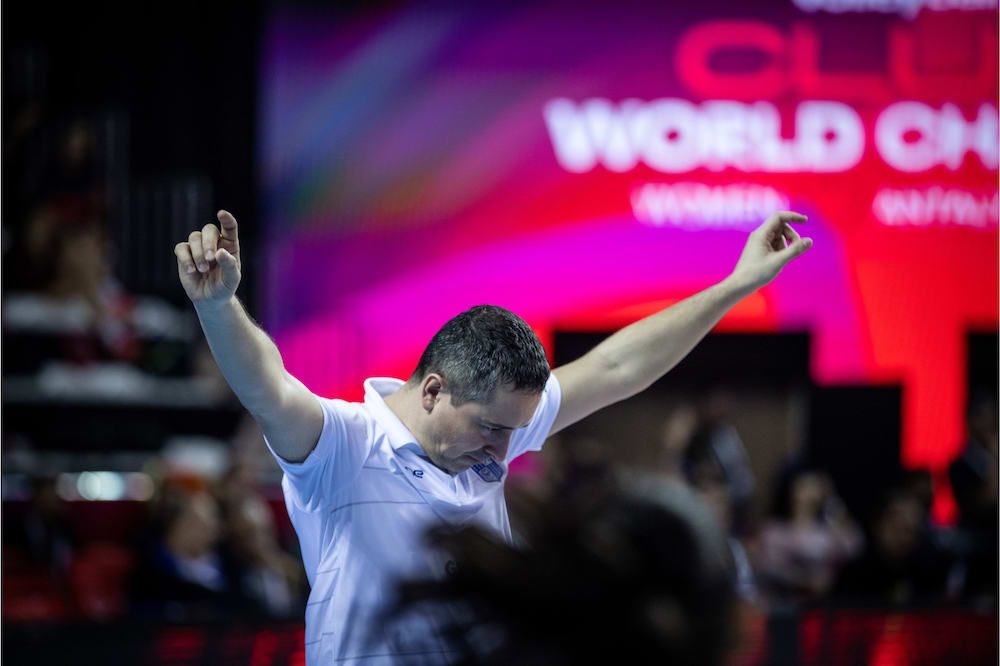
Meanwhile, I'd like to make the game more enjoyable and fun. I believe we can do away with one rule.
And it's the libero's second touch inside the three-meter zone.
Today, the men's game has progressed to the point where they use the second touch from six with the spiker, attack directly, or set to two or four.
In women's volleyball almost all teams are organized with the libero's second touch to take over the set. Where the libero, in my opinion, became a second setter on the court. Especially during the transition game.
This is fantastic. I enjoy seeing some libero's play in the same manner as a setter. Why not allow the libero to make an overhead second touch inside of the three meter area.
This will enable a quick and aggressive transition game. That rule is something I'd like to see implemented.
Best game you've ever seen. What recent or game from the volleyball vaults did validate once more that volleyball is the greatest sport on the globe
It's difficult to choose from so many games. It's extremely difficult to decide. I mean, I remember every single Olympic or World Championship final. But let's talk about the last few years.
There are a few games that, in my opinion, express the best club volleyball level in the women's game.
The Champions League final in Verona two years ago. Between, Conegliano and Vakifbank. Which resulted in a 3-2 match.
But there is another game, still in this saga between Conegliano and Vakifbank.
A game with even more agonistic and technical content. That was the Club World Championship 2019 semi-final.
If I recall correctly, Conegliano won the tie-break 23-21. With a great comeback from 10 to 14, I believe.
And, in my opinion, these two games between these two incredible teams helped raise the global level of women's club volleyball.
*crazy comeback. Crazy, crazy comeback.
If you would have the ability to put together the world's most performing volleyball player. Which (5) characteristics would he/she have.
Yes, perhaps my response will be obvious. But I'd like to highlight these five characteristics.
The first is, of course, a player's physical characteristics, or athleticism.
Second, the technical abilities and skills. Third, I believe that attitude is extremely important.
The fourth point is leadership. A player's ability to lead on the court. Leadership that is more than just being a captain or a team leader. But leadership also in the meaning of taking decisions in the court.
And the fifth, and most important to me, is the vision of the game.
It is not only knowing how to do the things, but also knowing when to do them.
So the game's vision is really the meaning of being a player for me.
If you can make the strongest 'starting six' in the world, right now. What would your team look like? You can go all-time, current, whatever you want.
I'll choose the players based on what they represent today. Not over the course of their career, but today.
Setter, Joanna Wołosz, the Polish setter of Imoco Conegliano. Today she's the setter who's expressing the best volleyball. She's a player I watched develop into what she is today.
When I was coaching in Poland, she was a young girl of 18, 19 years old. And I always followed her career. And I saw how she steadily improved her game year after year. I believe she really exploded around the age of 25 or 26.
Her playing style has completely changed. And today, she's the best player in my opinion. She is the world's best setter.
Opposite, Paola Egonu. I believe she is the best attacker, the best spiker, and the only player today who can truly influence a single game more than any other.
Position 4, outside hitters, Gabi, Gabi of Vakifbank. Technically, she is the most complete player for me right now. All that experience, her vision of the game is astounding. What I was referring to earlier. She's yet another incredible player.
Zhu Ting, also. Zhu Ting is another expression of what women's volleyball is today for me. A tall player with excellent technical skills. Gabi and Zhu Ting are the outside hitters.
Middle blockers, Thaïsa is a player I've had the pleasure of coaching for the past four years. She's a fantastic player. Every day, I am surprised by her approach and attitude in the gym. I believe she is the best example of a 'complete' middle blocker. Because she has a powerful serve. She has a powerful attack. She has a significant block.
And for the other middle blocker, let's go with another player I had the pleasure of coaching for a few years. Which is Eda Erdem, the Turkish national team's middle blocker. The Turkish national team captain.
As a libero, Monica de Gennaro. In Conegliano, I worked with her for a few months. And I remember this story. I believe we're talking about 2004, which was 18 years ago. Monica was a youth player, and I was a starting scout man. We were both working and playing in Serie B, Italy's third division.
On a Saturday night, I recall a manager from the club in Vicenza driving us to the city where the Serie A team competed. Vicenza's first team. I vividly remembered this story when we met again as she a player of Conegliano and I'm the head coach of Minas, during the 2019 World Club Championship.
I had this flashback when I saw her there. Wow, we were two young people, a young player and a young coach, and look where we meet again after all these years.
That implies our volleyball journey was interesting. And, Monica, I believe, represents the best version of the libero today.
What is an advice that you would want to give to today's players?
Being a professional player or coach already comes with a lot of pressure.
It's a necessary part of our job. It will always be a part of what we do. But there's something out of control these days.
And I believe it is due to social media. I believe we have arrived at a perilous point.
I see some players more concentrated, more interested, about the opinion that the fans and the media have on social media about them than what they are actually expressing on the court.
And that, to me, is something dangerous. Of course, it is natural for the ego to be influenced by these opinions.
However, all of this disrupts the life of a player. I'm referring to a player's daily life and goals, real goals, concrete goals.
My recommendation is to pay less attention to this and focus more on the real job.
What has been your biggest lesson. Or what did come out of your most favorite failure?
Yes, there was a moment when I suffered greatly. It was a period even.
A period, not a single moment. There were a few key moments that caused me to suffer greatly as a coach and as a professional.
Looking back today, however, it has given me the motivation to do better. To strive to become a better coach.
As an assistant coach, and later as a head coach in Dobrawa, Poland, I always experienced positive seasons and good moments.
Then, in 2014, Imoco Conegliano called. I was coaching in Poland. I was happy in Poland. I had a good team, the club agreed, nay, insisted, on my going to Conegliano.
So I broke my contract in Poland. I relocated to Conegliano. Which is only ten kilometers from my hometown of Treviso.
I went in with high expectations. But I was let go after six or seven months. We also lost our setter, Alisha Glass, at the same time.
So, right when I expected the club's support, the decision to fire me was made. Of course, this caused me a great deal of pain. But that's okay; it's part of our job. You know you'll have to pay if there are no results. A coach pays when there are no results.
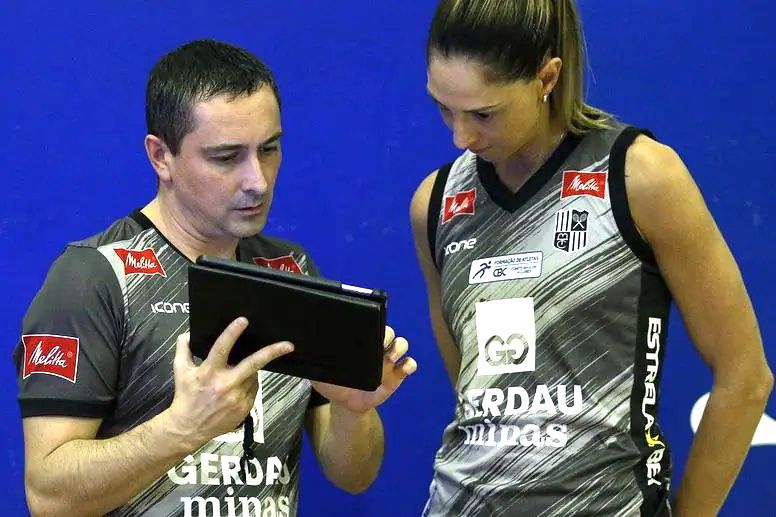
Then I returned to Poland, this time to Wroclaw. And I learned an important lesson because, as I previously stated, it is normal for a coach to pay for his inability to achieve results. But it's less common that when you get results, you have to pay again.
What happened? We had a difficult start to the season, with some injuries and some players arriving back from the national team who were not in peak condition.
We get back in a decent shape and win seven straight games in the Plusliga. Christmas arrives, and the club informs me that, while we are winning, the team is not performing well. They are not happy. So they need to make a change.
The market for player transfers was closed. So the only thing we can do is replace the coach. At that moment, I thought that a "big name coach" will arrive to help turn around the season. Instead, the president who fired me took control of the team the next day. He became the head coach.
And it was there that I learned a valuable lesson: there is something in our job that is beyond our control. Even if you get the results, you are not always protected.
As a result, I began to pay less attention to things over which I had no control.
And I resumed coaching at a lower level. I took a step back. And I began to focus solely on my coaching.
That was a valuable lesson for me. And I returned to work in the gym with a clearer mind. I had another experience, that wasn't easy after Poland.
But then coaching in Trento was crucial for me. I had two seasons where I could focus solely on coaching. And to return to feel at ease again as a coach.
Then there are the years in Brazil. They are, of course, the years of success. People can see my success, titles, and caps, but for me, it's all about what happened in the past that allowed this to happen.
Do you have a book that you like a lot? Which lessons did you get out of it?
I mostly read books that aren't about sports. But there is a book by Pete Carroll, an NFL football coach, that has had an impact on me.
The book is called "Win Forever," and it is an autobiography. It goes on to discuss his philosophy.
With the Seattle Seahawks, he won a Super Bowl. Prior to that, he twice won the NCAA championship with the Trojans, USC.
And in the years of being in Southern California, he developed this philosophy of coaching called "win forever". And it is something that has influenced me and is a reference to me.
Of course, I observe other volleyball coaches, as well as coaches from other sports. But Pete Carroll is a huge inspiration for me. And this book is something I'd like to recommend.
What do you do or tell yourself when you are overwhelmed?
That is also something I learned over time. In the past, I was full-time, with my head in the job, in volleyball. Taking a break was extremely difficult for me.
I learned how to separate these things today. And I can certainly manage the negative feelings and moments better.
I can look at it from a distance and with different eyes. This, I believe, aids in analyzing the situation. You can only make a great decision when you have a clear mind.
But when these moments would still happen and I'm back settled down; I always think the same thing.
That is, I keep telling myself that I am a lucky person, a lucky man.
Because volleyball was my great passion. Volleyball was my great hobby. And I consider myself extremely fortunate to do this profession.
And I think about all the people who did not have this opportunity. Perhaps they have a passion or a hobby that they are unable to make a living from.
So I believe that I, as well as everyone else who works in professional sports, art, or these other areas. That they are extremely fortunate.
I'm grateful for it every day and will never forget it.
Minas last game, solid opponents lib action!
Thank you Nicola.

